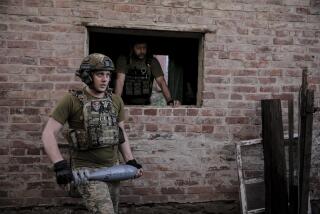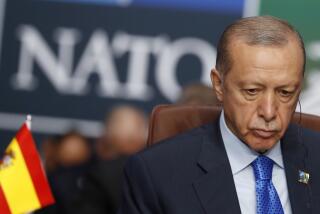Turkish Parliament Authorizes U.S. Planes to Open 2nd Front in North
- Share via
INCIRLIK AIR BASE, Turkey — American-allied Turkey took a major step toward war Thursday, authorizing a swelling armada of U.S. warplanes here to open a second air front against Iraq.
“Turkish airspace can be used if the U.S. wants. It is up to the U.S. command,” said President Turgut Ozal after Parliament in Ankara authorized American strikes against Iraq from Turkey with government permission.
Augmenting powers first granted in September, the Parliament, by a 250-148 vote along party lines, also gave Ozal the authority he sought to launch cross-border military operations and to allow an expanded number of American forces in Turkey.
Ozal said, however, that Turkey, the only Muslim member of the North Atlantic Treaty Organization, does not intend to launch any military action of its own against its Arab neighbor to the south: “The Turkish armed forces will not fight unless attacked,” he said.
Officials in Ankara say a 130,000-member Turkish army along the border, being reinforced with additional armor and mechanized infantry even as war began, would only intervene directly if Syria or Iran attempted to divide up Iraq in the event of postwar chaos there.
At this sprawling NATO base near the southern Turkish city of Adana, a spokeswoman said more American warplanes and at least one AWACS radar surveillance plane arrived Thursday to join 48 fighters and bombers that have been stationed at Incirlik since the crisis began. The base’s fighting strength is scheduled to grow to 96 by week’s end--a force of F-111 and F-16 fighter-bombers and F-15 interceptors.
Initial air strikes against Iraq came from aircraft carriers and land-based planes from Saudi Arabia in the south. The use of Turkish bases north of Iraq would give the United States not only an expanded air arsenal but also a new point of attack, observers here noted.
Meeting with reporters here Thursday, the Turkish base commander stressed that Incirlik, its defenses improved by ongoing installation of a donated U.S. Patriot anti-missile system, had played no role in the opening round of war.
Until the parliamentary war powers vote Thursday, American use of the Turkish-controlled base was restricted to logistic and humanitarian support. A number of search-and-rescue aircraft are based here, as well as C-130 cargo planes shown to reporters Friday.
“Fighter pilots are always eager. That says nothing about the permission of the Turkish general staff,” said Col. Gary R. Lorenz, commander of about 3,500 U.S. forces at Incirlik.
Anti-terrorist security was strict at the base Thursday. Nearby Turkish residents, though, seemed less concerned than the thousands of Turks who have fled cities close to the Iraqi border in the past few days.
“With all the American defenses here, this must be the safest place to be,” said one restaurant owner, opening for business as usual Thursday.
Ozal, forewarned by President Bush about 90 minutes before the war began, is pursuing a policy intended to make Turkey a major force in the Middle East. The Turkish armed forces, however, are reluctant to abandon a non-interventionist stance that is a longtime pillar of modern Turkey’s foreign policy.
Incirlik is about 460 miles north of the Iraqi frontier, near the extreme combat range of the aircraft based here. However, the action Thursday by Parliament, which is dominated by Ozal’s Motherland Party, would apparently clear the way for the American jets to strike from Turkish bases near the border or to refuel in midair, prohibited until now.
Under Ozal, Turkey has been one of the staunchest supporters of collective international actions against Saddam Hussein, with whom he had clashed over Turkish water projects on the Tigris and Euphrates Rivers, shared by both countries.
“Saddam Hussein is a dictator, and my people don’t like him,” Ozal said Thursday, urging the alliance to sustain the pressure to assure Hussein’s removal from power.
From the outset of the gulf crisis, Ozal has been markedly more hawkish than the Turkish public. On Thursday, Turkish press commentators repeatedly lamented the loss of fellow Muslim lives in the opening attacks.
Calling the war “one of humanity’s worst disasters,” Foreign Minister Kurtcebe Alptemocin said: “There is a fire in our next-door neighbor’s house; these are awful developments. We want this to end.”
In the aftermath of a meeting in Ankara last weekend between Ozal and Secretary of State James A. Baker III, the U.S. will bolster Turkey’s large but dated armed forces, donating not only the Patriot battery here but also transferring $82 million in ammunition and military equipment, as well as increasing military aid next fiscal year.
In addition to the expanding force of American jets, there are also 42 German, Italian and Belgian warplanes in Turkey, a symbolic force intended to remind Iraq that if it attacks Turkey, it attacks NATO. The European planes are for defensive purposes only, Ozal said Thursday, reaffirming government policy.
More to Read
Sign up for Essential California
The most important California stories and recommendations in your inbox every morning.
You may occasionally receive promotional content from the Los Angeles Times.












